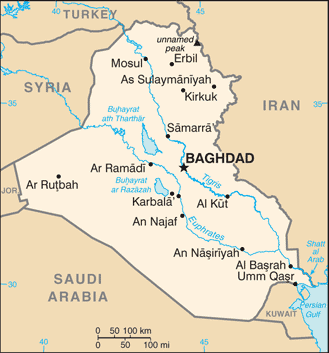In recent weeks, Iraq reached a milestone in its oil sector: it topped 3 million barrels per day (bpd) in production, the highest level since the U.S. invasion in 2003. Also, Iraq surpassed Iran in oil production, which has not happened since the 1980’s. By moving past Iran, Iraq is now the second largest oil producer in OPEC, with only Saudi Arabai producing more.
The International Energy Agency (IEA) released a report on Iraq’s energy sector this week, “Iraq Energy Outlook,” highlighting the huge strides the country has made in getting production back online in the last several years. It projected that Iraq could double its daily oil production to 6 million bpd by 2020. In the most optimistic scenario, which IEA predicts is unlikely, production could reach as high as 12 million bpd. Still, Iraq has enormous potential to expand.
This represents a massive economic opportunity for a country in which 95% of government revenue comes from oil exports.
The unique thing about Iraq is that not only does it possess the fifth largest proven oil reserves in the world, but nearly all of those reserves are concentrated in big fields that are easy to reach. It is all onshore, on flat land, where the geology is not particularly complicated, in sparsely populated regions, and the quality of oil is such that it does not need special upgrading. All this conspires to make operating costs equal to about $2 per barrel, extremely low compared to other fields around the world.
However, several obstacles stand in the way of Iraq realizing its full potential.
First, the government has not cleared up how the oil sector is to be managed – it has not passed a hydrocarbon law. Debated for years but still not agreed upon, a legal framework for the oil sector has created uncertainty moving forward. Iraq has still opened up oil production to international oil companies, and several have started producing. However, Kurdistan has moved ahead of the federal government without its approval, signing deals with ExxonMobil, Chevron and Total. The federal government has stated that oil companies that operate in Kurdistan without federal approval will be barred from operating elsewhere in the country. The confusion between federal and regional governance over oil rights, in absence of a legal framework, may slow investment.
 Second, Iraq’s infrastructure is in bad shape, due to underinvestment and damage from three significant wars in the last 30 years. As the IEA report explains, “Processing facilities, pumping stations, storage tanks and pipelines, where not destroyed outright, saw their condition deteriorate substantially in the 1990s, as international sanctions interfered with proper maintenance.” It also notes that in 2011, oil production was routinely restricted due to infrastructure constraints.
Second, Iraq’s infrastructure is in bad shape, due to underinvestment and damage from three significant wars in the last 30 years. As the IEA report explains, “Processing facilities, pumping stations, storage tanks and pipelines, where not destroyed outright, saw their condition deteriorate substantially in the 1990s, as international sanctions interfered with proper maintenance.” It also notes that in 2011, oil production was routinely restricted due to infrastructure constraints.
Third, security will be critical to the fortunes of Iraq’s oil sector. Violence has sharply declined in the last five years, but security may still plague infrastructure development and deter oil companies from moving in.
What are the global implications of Iraq’s oil development?
With an additional 3 million bpd coming online by 2020 and perhaps 5.6 million bpd by 2035, Iraq is expected to be by far the biggest contributor to global supply growth over the next several decades. (By way of comparison, while there is a lot of excitement around oil production in the United States, the U.S. is only expected to add an extra 1 million bpd…by 2035).
As the IEA report notes, if Iraq fails in this endeavor, oil prices will be sharply higher and more volatile than they otherwise would be. In this sense, there is no other country in the world that is more important in meeting global oil demand over the coming years than Iraq.



